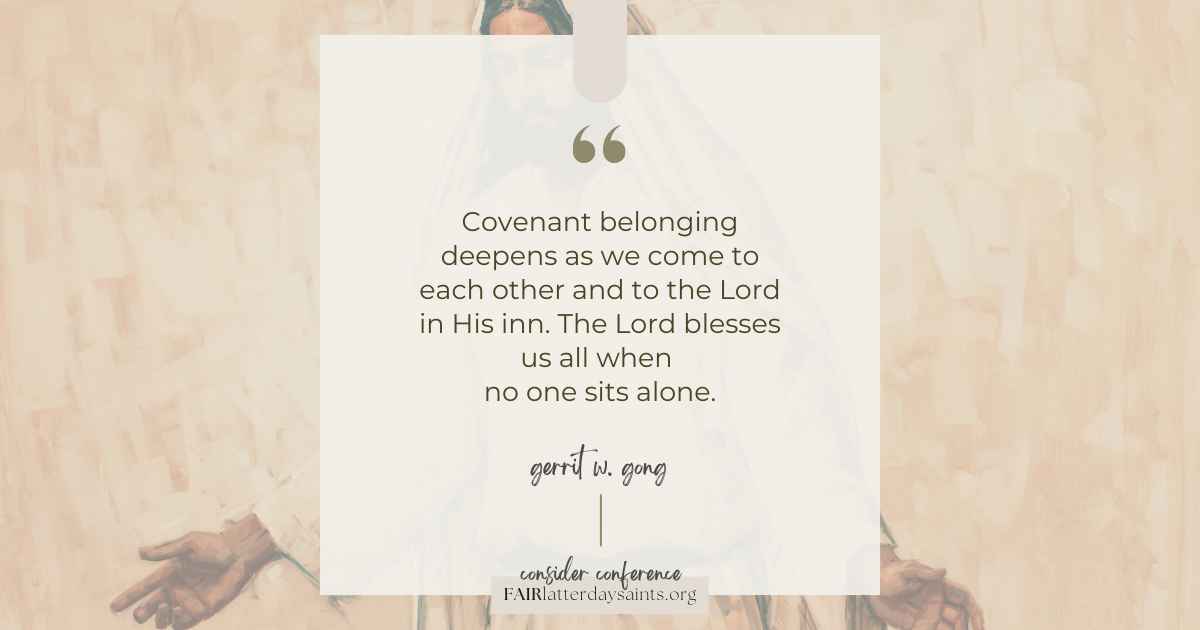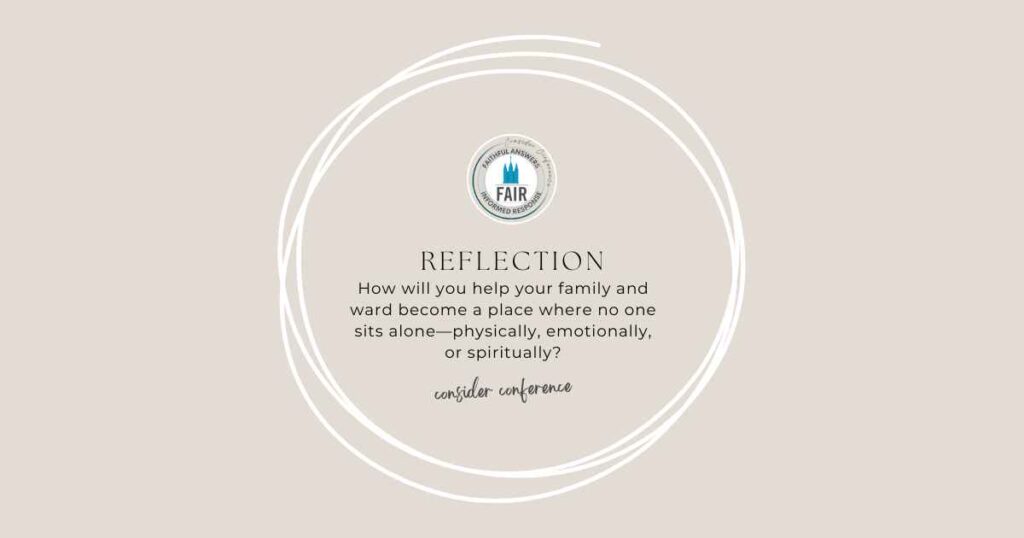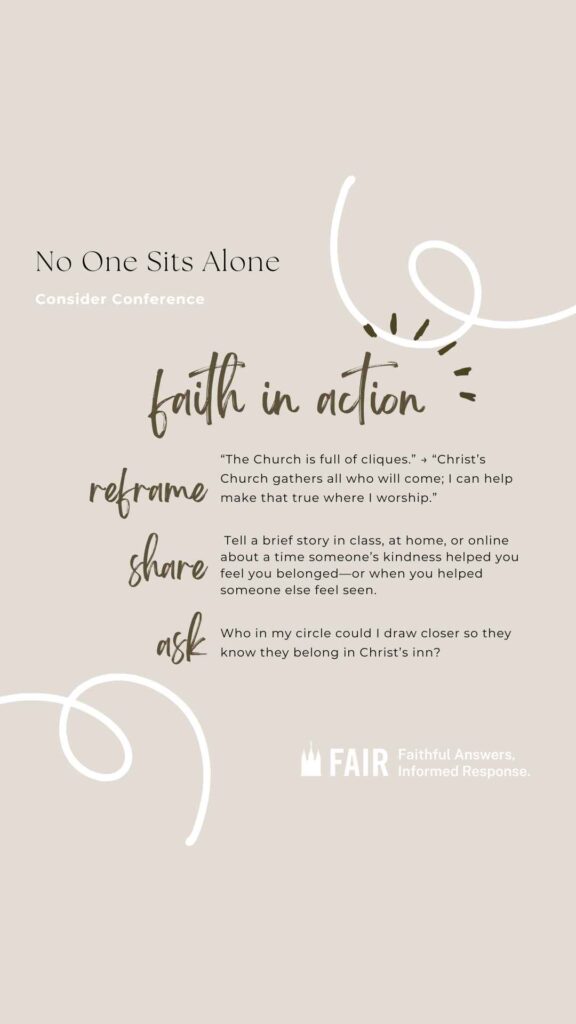
In his October 2025 General Conference address, Elder Gerrit W. Gong taught that living the gospel of Jesus Christ means creating space for everyone in His restored Church. “The spirit of ‘room in the inn,’” he said, “includes ‘no one sits alone.’”
Critics sometimes claim that the Church of Jesus Christ of Latter-day Saints isn’t truly inclusive—that its members are friendly only within familiar circles or cultural comfort zones. From the outside, this can look like cliquishness or indifference, especially when visitors or those who feel different are unintentionally overlooked.
But Elder Gong’s message is just as searching for those inside the fold. He invites covenant members to examine our own habits of belonging and be vigilant against forming cliques or closed circles. The Savior’s Church cannot thrive on “insiders and outsiders.” Every ward and branch should feel like His inn—open, warm, and attentive to those who arrive weary, wondering if they will be seen.
Genuine belonging in the Church isn’t a social gesture—it is a doctrinal covenant rooted in Jesus Christ Himself.

Common Criticism: The Church Isn’t Welcoming
“The Church isn’t welcoming—it’s full of cliques and cultural barriers.”
This perception arises when visitors, new converts, or long-time members feel unseen or disconnected. Some conclude that the exclusive “gospel culture” is just Utah culture or that inclusion depends on fitting a specific mold of appearance, background, or belief.
Fallacy at Work: Out-Group Bias
Out-Group Bias is the tendency to see those outside our group as less relatable, less moral, or less deserving of empathy. It narrows the circle of compassion by dividing people into “us” and “them.”
In Church life, Out-Group Bias can appear in quiet, unintentional ways. It shows up when we glance past the new face in the hallway, assuming they won’t fit in here or someone else will talk to them. It whispers that people who dress differently, speak with an accent, or have questions about faith or identity probably “wouldn’t understand.” Left unchecked, that bias can build invisible walls in our congregations—walls that make others feel like guests rather than family.
Elder Gong’s Correction: Elder Gong urges us to recognize and dismantle those barriers. Every ward, branch, and quorum should reflect the Lord’s inclusive invitation: “Come unto me, all ye that labour and are heavy laden.” The Savior’s gospel culture has no “us and them”—only we, gathered together in covenant belonging.
Elder Gong’s teaching dismantles the Out-Group bias. In gospel culture, there is no “out-group.” Christ “inviteth all to come unto Him” (2 Nephi 26:33). Every covenant member—and every seeker—is already included in the invitation to the “supper of the Lamb.”
Resolving this Fallacy: Gospel belonging is not a social program—it’s a divine pattern. The Church gathers “from every nation, kindred, tongue, and people” to form one body in Christ. When we make room for others—especially those who feel they are different—we are not merely being polite; we are living our covenants to “mourn with those that mourn” and to “comfort those that stand in need of comfort” (Mosiah 18:9, 21).
Elder Gong’s correction is clear: the culture of Christ’s Church is the culture of covenant inclusion. Every time we extend a sincere “hello,” sit beside someone new, or bridge a cultural gap, we enact the very pattern of Zion.
Living Apologetics: Creating Gospel Culture
A frequent misunderstanding is that inclusion means relaxing doctrine or erasing differences. Elder Gong reframes it: true inclusion is rooted in covenant discipleship, not cultural conformity.
Gospel belonging does not require us to set aside revealed commandments or endorse every choice. The Savior’s invitation is both merciful and covenantal: He meets us where we are but never leaves us there. To welcome someone is to acknowledge divine worth, extend friendship, and invite discipleship—not to redefine the doctrine that anchors that invitation.
- If someone says: “The Church just isn’t very welcoming.”
- You can respond: “That’s exactly why Elder Gong taught that ‘no one sits alone.’ Belonging in the gospel isn’t about blending in—it’s about being gathered to Christ. Each of us is responsible to make room in His inn.”
Ways to Apply Today:
1️⃣ See and sit. At Church, look for someone sitting alone. A simple greeting or choosing to sit beside them can change everything.
2️⃣ Bridge cultures. Learn from members whose backgrounds differ from yours; their experiences expand your understanding of gospel culture.
3️⃣ Check your circle. Ask in prayer: “Lord, who feels unseen in my ward family?” Then act on the impression that comes.
Keep This Talk With You
Elder Gong’s invitation calls covenant members to examine our own habits of belonging and to be vigilant against forming invisible circles that keep others at arm’s length. True discipleship requires us to stretch our hearts beyond what is comfortable, to reach across differences of background, belief, or circumstance, and to welcome others as fellow travelers in Christ’s inn. Welcoming someone does not mean we must agree with every viewpoint or lifestyle—it means we recognize divine worth, extend friendship, and invite discipleship rooted in the Savior’s doctrine.
When both sides of this equation are met—when those outside are willing to look again with understanding, and those inside are determined to love more deliberately—the result is what Elder Gong called covenant belonging. It deepens as we come to each other and to the Lord in His inn. The Lord blesses us all when no one sits alone. And who knows? Maybe the person we sit next to will become, as Elder Gong said, “our best fortune-cookie friend.” As we find and make place for Him and for each other at the supper of the Lamb, we begin to glimpse the unity and joy of Zion itself.
This week, try one small step:
- Sit beside someone you don’t know at church. A simple act of sitting next to another person can turn a stranger into a friend and remind both of you that there is room in Christ’s inn for all.
- Learn how their journey of faith began. Listening to someone’s story builds understanding and breaks down invisible walls that separate “us” from “them.”
- Pray to see your ward through the Savior’s eyes. Ask to notice who feels left out or unseen, and let His compassion guide you to act with warmth and courage.
How will you help your ward become a place where no one sits alone—physically, emotionally, or spiritually?

The Consider Conference series by FAIR offers an in-depth look at recent General Conference talks to help members of the Church of Jesus Christ of Latter-day Saints navigate common questions, misunderstandings, and criticisms. Each post provides doctrinal insights, historical context, and practical ways to apply gospel principles in everyday conversations. Through this series, we hope to equip readers with faith-promoting resources that encourage thoughtful reflection, respectful dialogue, and a stronger foundation in gospel truths, fostering both personal conviction and meaningful discussions with others.
The post No One Sits Alone appeared first on FAIR.
Continue reading at the original source →




